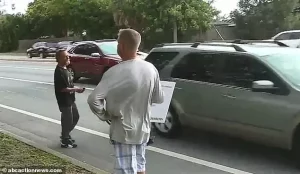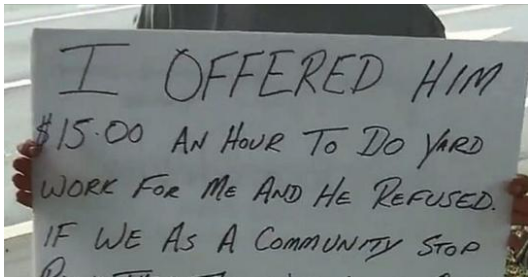Ryan Bray is a man known for his kind heart and willingness to help those in need. One Sunday, on his way home from work, he encountered a panhandler begging for change on the street. Instead of simply giving him some spare change, Bray decided to offer the man a more substantial form of help.
Bray proposed a job offer, paying the panhandler $15 an hour to work for his family business. However, to his surprise, the man flatly refused the offer. The panhandler seemed content with begging, claiming that he earned more money per hour than Bray was offering. Bray was taken aback by the man’s response, which quickly turned menacing.

Feeling offended by the panhandler’s outburst, Bray decided to take a stand. He went home, created a sign, and returned to the same street corner. The sign urged motorists not to give money to beggars, and Bray stood proudly beside it, shaming the panhandler for his laziness.
The panhandler, who chose to remain anonymous, later claimed that Bray had lied about offering him a job. He insisted that all he wanted was help to get back on his feet. However, Bray stood firm, maintaining that he had indeed offered the panhandler a job, which was refused.
Bray’s actions sparked a heated debate about the best way to help those in need. While some praised Bray’s efforts to encourage the panhandler to find employment, others criticized his approach as being too confrontational. Bray’s response was simple: “If we as a community stop paying them, they will leave our neighborhood.”
The incident highlights the complexities of helping those in need. While kindness and generosity are essential, they must be met with a willingness to accept help and make positive changes. In this case, the panhandler’s refusal of Bray’s offer raises questions about the motivations of those who beg on the streets.


